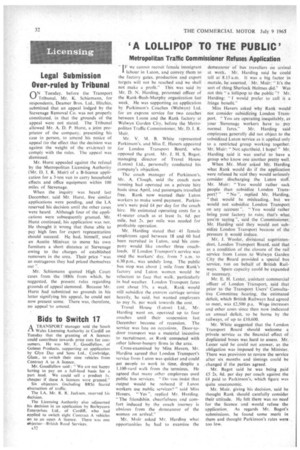'A LOLLIPOP TO THE PUBLIC'
Page 34

If you've noticed an error in this article please click here to report it so we can fix it.
Metropolitan Traffic Commissioner Refuses Application
" IF we cannot recruit female immigrant
we in Luton. and convey them to the factory gates, production and export targets will not be reached and we shall not make a profit." This was said by Mr. D. N. Harding, personnel officer of the Rank-Bush-Murphy organization last week. He was supporting an application by Parkinson's Coaches (Welwyn) Ltd. for an express service for two coaches between Luton and the Rank factory at Welwyn Garden City, before the Metropolitan Traffic Commissioner. Mr. D. I. R. Muir.
Mr. V. M. B. White represented Parkinson's, and Miss E. Havers appeared for London Transport Board, who opposed the grant. Mr. .1. H. S. Bagot. managing director of Travel House (Luton) Ltd., personally conducted his company's objection.
The coach manager of Parkinson's, Mr. A. Clough. said the coach now running had operated on a private hire basis since April, and passengers travelled free. Rank now wanted their Luton workers to make some payment. Parkinson's were paid £4 per day for the coach hire. He estimated operating costs for a 41-seater coach as at least Is. 6d. per mile, hut 2s. per mile was needed for profitable operation.
Mr. Harding stated that 41 female employees aged between 18 and 60 had been recruited in Luton, and his company would like another three coach' loads. If London Transport's service was used the workers' day. from 7 a.m. to 6.30 p.m., was unduly long. The public bus stop was about ; mile from Rank's factory and Luton women would he reluctant to face that walk, particularly in had weather. London Transport fares cost about 35s. a week. Rank would still subsidize the express carriage service heavily, he said. hut wanted employees to nay 5s. per week towards the cost.
Travel House (Luton) Ltd., Mr. Harding went on. operated up to four coaches until their suspension last December because of recession, The service was late on occasions. Door-todoor transport was a material incentive to recruitment, as Rank competed with other labour-hungry firms in the area.
Cross-examined by Miss Havers. Mr. Harding agreed that London Transport's service from I,uton was quicker and could get people to work in time, despite a 1.100-yard walk from the terminus. He agreed that many other employees used public bus services. " Do you insist that output would he reduced if Luton workers use public services?" said Miss Havers. "Yes", replied Mr. Harding. "The friendship, cheerfulness and comfort induced by the coach journey is obvious from the demeanour of the women on arrival.
Mr. Muir asked Mr. Harding what opportunities he had to examine the
demeanour of bus travellers on arrival at work, Mr. Harding said he could tell at 8.15 a.m. It was a big factor in morale, he asserted, Mr. Muir: " It's the sort of thing Sherlock Holmes did." Was not this "a lollipop to the public "? Mr. Harding: " I would prefer to call it a fringe benefit:
Miss Havers asked why Rank would not consider subsidizing London Trans port. You are operating inequitably, as your Stevenage workers have to pay normal fares." Mr. Harding said employees generally did not object to the subsidized Luton service as it applied only to a restricted group working together. Mr. Muir: " Not apartheid, I hope!" Mr. Harding said it was useful to have a group who know one another pretty well.
When Mr. Muir asked Mr. Harding what Rank would do if the application were refused he said they would seriously consider discharging the Luton staff. Mr. Muir: "You would rather sack people than subsidize London Transport? " " No ", replied Mr. Harding, "that would be misleading, but we would not subsidize London Transport on any account 'You would rather bring your factory to ruin; that's what you're saying ", said the Commissioner. Mr. Harding said they would not subsidize London Transport because of the pressure it would induce.
Mr. J. Wooler, divisional superintendent. London Transport Board, said that as a condition of the closure of the rail service from Luton to Welwyn Garden City the Board provided a special bus service, run on behalf of British Railways. Spare capacity could be expanded if necessary.
Mr. E. H. Lester, assistant commercial officer of London Transport, said that prior to the Transport Users' Consultative Committee hearing, the estimated deficit, which British Railways had agreed to meet, was £2,500 p.a. Wage increases and other costs since then now indicated an annual deficit, to be borne by the railways, of up to £10.600.
Mr. White suggested that the London Transport Board should welcome a private service as the financial effect of duplicated buses was hard to assess. Mr. Lester said he could not answer, as the obligation was imposed by the Minister. There was provision to review the service after six months and timings could be changed if the parties agreed.
Mr. Bagot said he was being paid £5 2s. 6d. per day per coach against the +A paid to Parkinson's, which figure was quite uneconomic.
Mr. Muir. giving his decision, said he thought Rank should carefully consider their attitude. He felt there was no need for the licence and would refuse the application. As regards Mr. Bagot's submissions. he found some merit in them and thought Parkinson's rates were too low.




















































































































